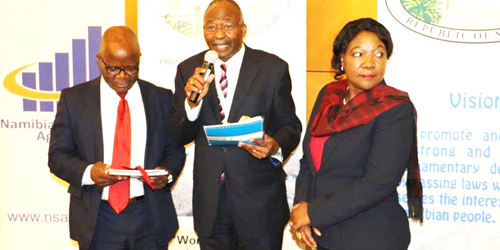A regional parliamentary seminar is held in Namibia on the effects of malnutrition on economic development
From 28 to 29 September 2015, the Parliament of Namibia hosted a regional seminar on Promoting child nutrition in the Southern African Development Community (SADC) region. The event was organised by the Inter-Parliamentary Union and UNICEF in Windhoek, Namibia, to enhance the understanding of parliamentarians and parliamentary…

At the event, the Speaker of the Namibia National Assembly Professor Peter H. Katjavivi launched the report entitled: “A Namibia fit for children – 25 years of progress.” Photo © New Era
From 28 to 29 September 2015, the Parliament of Namibia hosted a regional seminar on Promoting child nutrition in the Southern African Development Community (SADC) region. The event was organised by the Inter-Parliamentary Union and UNICEF in Windhoek, Namibia, to enhance the understanding of parliamentarians and parliamentary staff on issues related to malnutrition and stunting, including the damaging effects on countries’ economic development of the lack of measures to fight malnutrition. An emphasis was placed on the strategies and tools parliamentarians can use to leverage to scale up and strengthen nutrition programmes and policies.
The nine countries in the South African Development Community at the event produced an outcome document which included a list of priority actions for parliaments and their members.
The priority actions are:
- Legislation and policy: We commit to review our existing legal and policy frameworks from a nutrition-sensitive perspective, in order to ensure there is a comprehensive legal framework in place for nutrition.
- Budget allocation and expenditure: We agree that budget allocation is crucial for the enforcement of legislation and the implementation of policies and programmes aimed at improving infant and young child nutrition. It is also essential to ensure that a fair share of the budget is allocated to key ministries responsible for the delivery of such programmes and for the implementation, monitoring and enforcement of pronutrition legislation. Equally, we have a role to play in monitoring expenditure and making sure money is properly spent.
- Oversight: We agree that it is essential to use our powers of scrutiny and oversight to hold governments to account for the enforcement of existing laws and policies. We will continue to hold governments to account and track compliance and implementation of the approved budget and policies either by making use of existing parliamentary committees and caucuses, or by establishing appropriate subcommittees.
- Representation and awareness-raising: We commit to being champions for nutrition and for children and families, especially the most vulnerable. We will use our position to galvanize action and draw attention (using current evidence and data) to the unacceptably high rates of malnutrition that continue to afflict so many of our nations in SADC.
- Develop nutrition-friendly parliamentary mechanisms: We acknowledge that more needs to be done within our parliaments to secure a better response to the nutritional needs of children, especially the most vulnerable. We commit to identifying ways to build our capacity to address infant and young child nutritionrelated issues in our daily work, including through improved engagement with youth organisations.
- Coordination and cooperation: We pledge to ensure that we coordinate our activities and work in partnership with other actors, including civil society, donors, development bodies and international organizations, such as UNICEF, IPU, the World Health Organization, the Food and Agriculture Organization, and the World Food Programme. We will explore effective coordination frameworks that harmonize the activities of government, audit offices, parliaments and civil society. We underscore the importance of coordinating actions across party lines between individual MPs and the committees and caucuses on which we serve. We furthermore commit to expanding regional coordination and to pursue parliamentary exchanges and cooperation in order to share best practices and inspire each other to accelerate the nutrition agenda.
Download the outcome document: English | Français
Learn more about the event: Inter-Parliamentary Union and at New Era